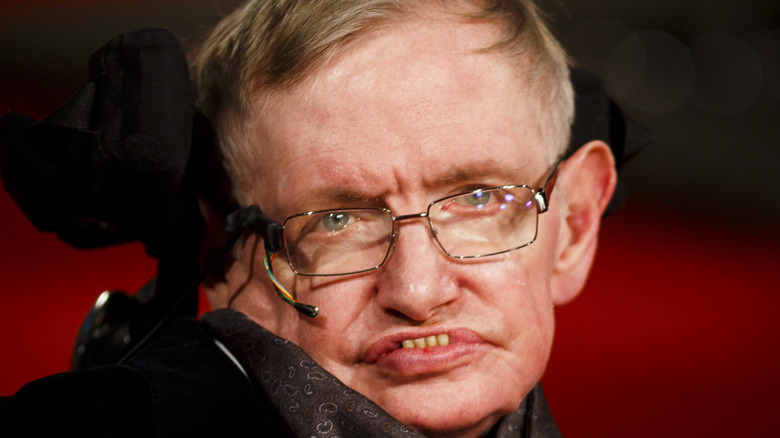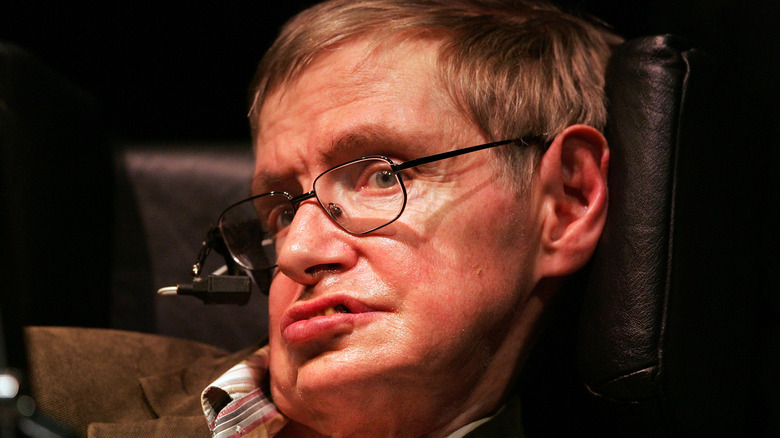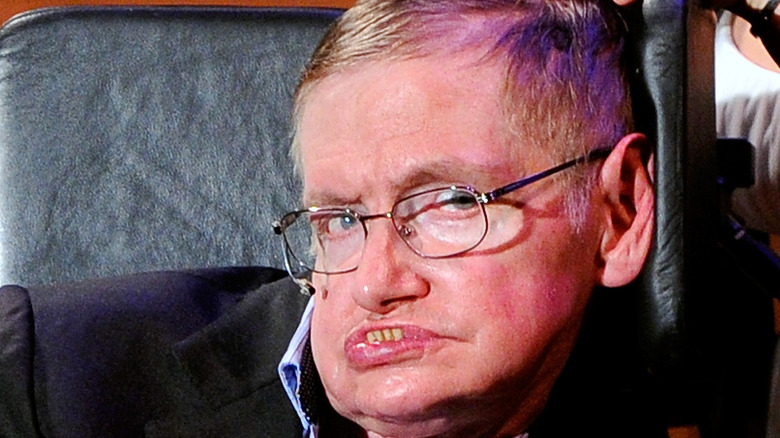The Story Behind How Stephen Hawking Pranked A BBC Reporter
Stephen Hawking is one of the most well-known and acclaimed minds of the past century. He released multiple books on theoretical physics such as "A Brief History of Time" and "The Theory of Everything," the former spending 147 weeks on the New York Times bestseller list in the 1980s despite many believing that it would not reach many outside of academia (per Washington Post).
He may be even more recognized for his use of technology to communicate in the decades that followed his amyotrophic lateral sclerosis (ALS) diagnosis. After being diagnosed, he was hospitalized with pneumonia and needed a tracheostomy, which led him to famously use a computer to convert his typing into speech, albeit robotic speech, according to his website. Though his affinity for a subject as complex as physics and his battle with ALS already make him an inspiring figure, what is more inspiring is the fact that his career and medical condition did not prevent him from maintaining a sense of humor.
Stephen Hawking pretended his medical equipment was unplugged
Pallab Ghosh had the opportunity to interview Stephen Hawking for the BBC on multiple occasions. At their first meeting in 2004, a BBC camera operator wanted to change the lighting prior to the interview. Hawking's staff gave him the go ahead to unplug something from his office to use the socket for camera equipment. An alarm sounded and Hawking slumped over in his wheelchair. Ghosh and the cameraman worried that they had unplugged a source of Hawking's medical support equipment. However, the alarm was for the "uninterruptible power supply" used for Hawking's computer and Hawking was not in any medical danger.
Hawking's website credits his wit to his computerized communication. Being forced to type out each word made Hawking convey his thoughts in a brief and dry manner. Maybe typing out responses gave him time to formulate his words more precisely than someone who speaks without text-to-speech aids.
Stephen Hawking liked to laugh at himself too
Along with occasional pranks, Stephen Hawking was able to laugh at himself too. He explained that his disability helps him avoid "boring committees" and when speaking about Eddie Redmayne — who played the role of Hawking in "The Theory of Everything" — Hawking quipped that Redmayne may have gotten to use the computerized voice, but stated that Redmayne did not have his "good looks" (via Biography).
Hawking is not the only person with a disability to also display a healthy sense of humor. Popular Youtuber Shane Burcaw gained a following for his humorous descriptions of his life with Spinal Muscular Atrophy (SMA). Like Hawking, Burcaw uses a motorized wheelchair due to his condition. Even the titles of Burcaw's books "Laughing at My Nightmare" and "Strangers Assume My Girlfriend is My Nurse" are prime examples of his use of humor to navigate life in a world that is not always kind to those with disabilities. Perhaps we all could follow Hawking and Burcaw's lead in making the best of difficult situations.


